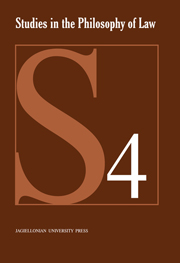Book contents
- Frontmatter
- Contents
- Preface
- Six Causes of the Dispute over Legal Bioethics
- Bioethics and Legal Philosophy
- The Outline of the Subject of Biojurisprudence
- Law and Biotechnology
- The Ethical Significance of Evolution
- Human Nature after Darwin
- The Notion of the Person in Bioethical Debates
- The Roots of Normativity. From Neuroscience to Legal Theory
- Why No One Should Ever Win the Nobel Prize: Neurolaw, Reward and Punishment
- Is There Anybody Who Really Wants to Live Forever? The Significance of Mortality
- The Slippery Slope Arguments Against the Legalization of Physician-Assisted Suicide
- Ethical Problems of Hematopoietic Stem Cells Transplantation
- Notes about the Authors
The Outline of the Subject of Biojurisprudence
Published online by Cambridge University Press: 05 September 2014
- Frontmatter
- Contents
- Preface
- Six Causes of the Dispute over Legal Bioethics
- Bioethics and Legal Philosophy
- The Outline of the Subject of Biojurisprudence
- Law and Biotechnology
- The Ethical Significance of Evolution
- Human Nature after Darwin
- The Notion of the Person in Bioethical Debates
- The Roots of Normativity. From Neuroscience to Legal Theory
- Why No One Should Ever Win the Nobel Prize: Neurolaw, Reward and Punishment
- Is There Anybody Who Really Wants to Live Forever? The Significance of Mortality
- The Slippery Slope Arguments Against the Legalization of Physician-Assisted Suicide
- Ethical Problems of Hematopoietic Stem Cells Transplantation
- Notes about the Authors
Summary
The elements of the subject
The main elements of the subject of biojurisprudence are its name, ontology, axiology, epistemology, and methodology.
I coined the name ‘biojurisprudence’ from the Greek word bios, which denotes life, and from the Latin word iurisprudentia, which expresses legal knowledge or even wisdom.
Taking into consideration the natural rhythm of all life, especially human life – birth preceded by conception, life, and death, I have distinguished three segments of biojurisprudence: biojusgenesis, biojustherapy, and biojusthanatology.
Biojusgenesis as the world composed of bio – life, ius – law, and ‘genesis’ – origins, covers the first period of life from conception to birth, discussed from the normative standpoint, especially religious and moral, but mainly from the perspective of law called here biolaw: the law of life. In previous jurisprudence and the law based on it, the legal protection of this stage of human life was based on the legal fiction, called nasciturus, adopted from Roman law. According to it, the interest of the conceived child is treated as the interest of the child already born (nasciturus pro iam natu habetur quotiens de commodis eius agitur). Because of the highly developed and still developing techniques and technologies that may artificially interfere in the natural processes of the first stage of life, the legal fiction nasciturus is no longer adequate. The need for new normative regulations, recognized and described by biojurisprudence for biolaw, is even compelled by genetic engineering, eugenics, and medically assisted conception and birth – procreation and prenatal diagnostics.
- Type
- Chapter
- Information
- Studies in the Philosophy of LawLegal Philosophy and the Challenger of Biosciences, pp. 27 - 54Publisher: Jagiellonian University PressPrint publication year: 2010



